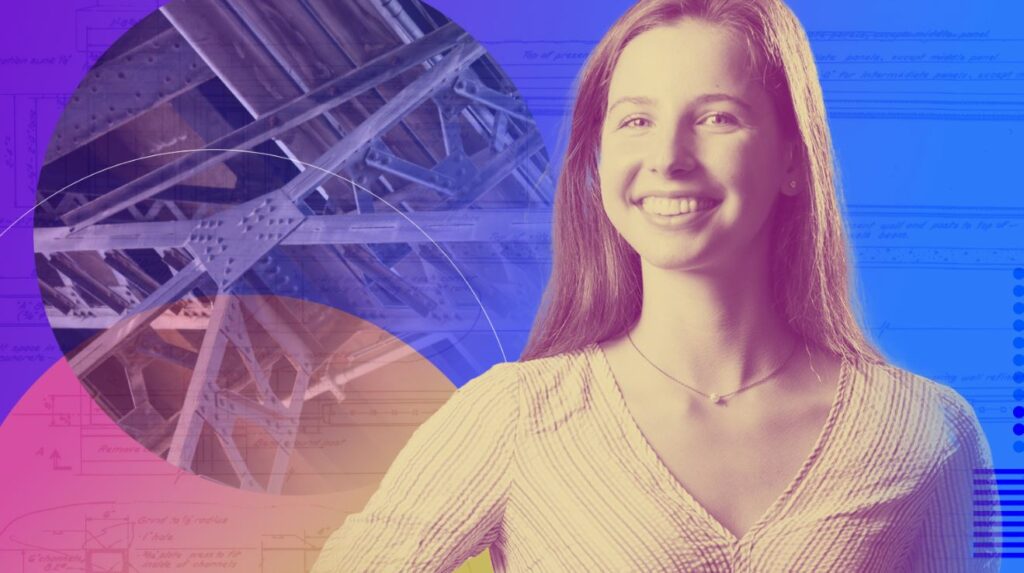STEM Star: The Infrastructure Sensor

Kristen Steudel ’22, mathematics and economics major, wants to find ways to make infrastructure safer.
By Bryan Hay
With a newly passed national infrastructure bill and a recent tragic collapse of a 12-story condo in Florida, Kristen Steudel ’22 is well aware that her cutting-edge study of infrastructure monitoring has far-reaching implications.
She interned this summer at the Engineering Institute at Los Alamos National Laboratory to study the use of sensors, which are designed to detect the structural integrity of bridges and buildings.
“We can use these sensors to figure out if a structure is still safe to use,” says Steudel (mathematics and economics and mechanical engineering), who worked with Los Alamos staff and two Ph.D. candidates on the technology. “What’s unique about it is that it’s nondestructive. A lot of monitoring equipment in engineering requires some destruction to determine the strength of a structure.”
She and her team turned to linear algebra and signal processing theory to develop an algorithm so the small sensors can be used effectively on bridges and buildings.
“With this technology, which can be used remotely, we can extend the engineering life of these structures or determine if there’s an unsafe condition that requires people to evacuate,” Steudel says. “It was an exciting summer. We can be more certain that all of our structures are safe.”
She’s been eager to do further research after learning that more than 127 bridges collapse in the United States every year. Bridges and other structures may be more expensive to build if constructed with remote sensors, but they may last longer, she notes.
After Lafayette, Steudel plans on graduate school to study the challenges of operational and environmental variability to improve the robustness of remote sensors. “This is one area that I may study, but I am also considering other areas of research. One of my long-term goals is to become a professor and lead mentoring programs,” she says.
Finding ways to make infrastructure safer and last longer is just one part of her academic journey. A senior design project with Amy Van Asselt, assistant professor of mechanical engineering, is focused on finding a practical method to add compressed air as a renewable energy source.
“We’re making a compressed air storage system. The unique part of the design that we’re doing is that it’s a smaller scale compressed air energy storage, because the few existing compressed air energy storage systems are large scale. One facility in McIntosh, Ala., has 110,000 kW of energy storage,” Steudel says. “In order to rely on renewable energy, we have to have more energy storage.
“That’s another really exciting project that I get to be part of with 10 other mechanical engineering students,” she adds. “And we’re also working with chemical engineers in the spring, making this a truly interdisciplinary project.”
Her academic adviser, Trent Gaugler, associate professor of math, says she is a joy to have both as a student and as an advisee.
“She brings tremendous energy and enthusiasm to all of her classes and projects,” he says. “Combining that with her desire to fully understand whatever she studies will no doubt yield great outcomes in all her future endeavors.”
1 Comment
Kudos to Kristen. Sounds really great. Infrastructure sensors would be great help in mitigating disasters from happening.
The new Infrastructure Bill that passed the Congress should support the research.
Comments are closed.